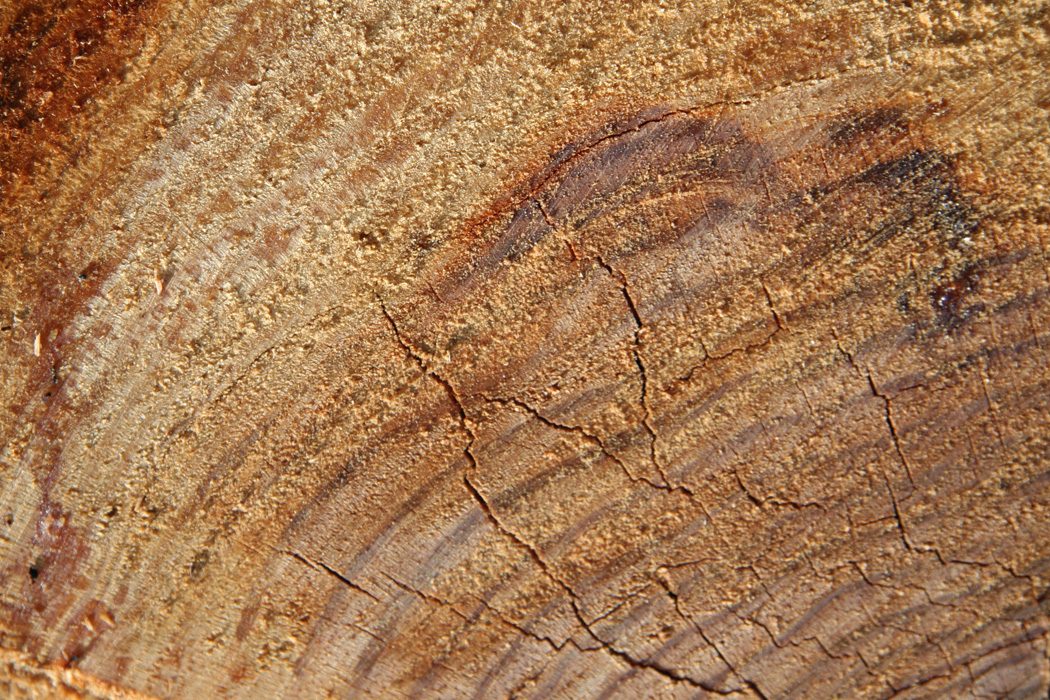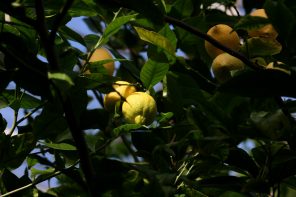I was in the kitchen, washing up the Sunday morning breakfast dishes in that frantic fog that rushes around young families attempting to get to a church service. I was calling from my sink station to see if teeth have been brushed and if the girls have on their nice white stockings when we heard that otherworldly CRACK! followed by a long whooshing crash. We felt the sound before we could even make sense of what we had just heard.
“What was that?” our seven-year-old daughter said into the immediate listening silence, and then I called out, “Is everyone okay?” We all began looking out windows, out into the front yard, then to the back. Was that lightning? What just happened? Then we went outside with umbrellas to investigate further.
The neighbors next door also emerged into the steady rain. There had been so much rain that spring already. Walking towards their property, we then saw the rain-felled oak in their yard. Our eyes traced the wreckage contrails of its fall on the way down. We stood with them at the top of the crown, politely.
I did not walk back around to see the 80-year-old tree’s enormous root ball just then, as my husband and daughters did. There were, in fact, two massive wounds: the naked exposure of the magnificent old oak tree’s most secret places and also the opened earth where it had once been cradled and held fast. The roots—its heart, its lungs, its fingers, its veins—now reached into air as if gasping for soil, with a few still holding on in a final, desperate handhold on that terrestrial cliff’s edge.
It took me days before I went to see it from that angle, long after I had commiserated with our neighbor about the horrible mess it had made. We agreed it could have been worse. There was significant damage to their shed, and the upper branches had sharply glanced a corner of their house, just by their kitchen window. They immediately got to work with power saws, slicing off the tree’s leafy top, its green glory removed and carted away, the raw reality made more tidy. But its proud, brown trunk remained in state for a long time before it was broken down into cords of firewood. I could see it out the window at my kitchen sink.
A few weeks later, our family sat on our deck on a rare dry night, my round belly growing ever more melon-like with our third child, a son, who was due in a few months’ time. As his arrival approached, I was increasingly feeling the slip of time, the bitter-sweetness of change. We read poetry aloud together, indulging my need of it. I craved a moment of stillness, an abeyance of that incessant tick of time, something poetry can sometimes provide.
We had barely had a chance to re-acclimate as a family of four after a year of living apart, when my husband served a year at the U.S. Embassy in Baghdad, Iraq, while our daughters and I had continued living in the scenery of our previous assignment in Amman, Jordan. We returned together as a family of four to a woody patch of Northern Virginia, and it was there I had expected (with no actual assurances from life itself) that, re-united, we would enter into a season of rest. Obviously, my husband and I had re-acclimated well enough to conceive a third child, but with our baby’s impending arrival, the goodness of life was starting to stack up faster than I could take it in.
*****
The rain kept falling even though the once-thirsty land had had enough.
“Really, the way your land lies, the water will flow down to there,” the arborist told us, hired as a matter of due diligence after our neighbor’s tree came down. “That’s the floodplain, so the water courses to those woods. Gosh, some of those trees are real beauties, and old. That one maple, it’s stunning, well formed. And usually they can process all that water, but when we get a long stretch of rain, well, …”
“… the trees can drown,” I said, finishing his sentence.
He nodded, looking towards the wooded distance. “Yes. They can.”
*****
The master poet Kay Ryan served as my emotional midwife on that deck that spring night. I asked my five-year-old daughter to read aloud Ryan’s typically tight meditation, “Crown,” from her Say Uncle collection, a title that fit my mood:
Too much rain
loosens trees.
In the hills giant oaks
fall upon their knees….
Something in me loosened too, as if Ryan had handed me a new way to measure time, or a freeing indifference to time entirely, a window flung open into the air of eternity. The moment was brief and intoxicating, and I wanted to gasp in that infinite moment, to cling to it with fingertips. Of course I cried.
*****
From a young age I feared moving, even though we did so only once in my growing up years. Now, every time my parents visit us in the countries of our various assignments, my mother reminds me that I had vowed once to “chain myself to one of the oak trees” before I would move away from the house we called “Four Oaks,” the name affixed to the mailbox out front, in a town where people really don’t name their houses. For all the moving I’ve done as an adult, I’ve more than run out of oaks to which to be chained. I’ve grown less fearful about the changes; somewhat.
The sounds of the moves are part of the memories. Folks in the diplomatic corps have keen ears for that high-pitched, plastic-toned sound of packing tape unspooling mechanically, slapping onto a box’s seams. We know the rustle of packing papers accumulating on the floor, like fallen autumn leaves. The flurry of activity at pack-out is like that of a newsroom, with huddled centers of activity, wrapping up the life’s material of a two- or three-year assignment. Sometimes one never really properly decides on the things themselves—keep, donate, or pitch?—so the moving company makes the decision on one’s behalf. There are fixed weight limits.
When people ask what all that moving around is like, I often say that I appreciate having the chance to evaluate regularly what we carry along with us in life, with those fixed limits, as if we got a spring-cleaning and a diet with every new assignment. But that’s not entirely accurate. In the end, there’s only so much one can decide on, only so much one can really hold onto well. The thousand seemingly insignificant links that tether us somewhere all feel mighty significant when the uprooting machine of another international move gears up.
I had stashed some of the priceless mementos from that Iraq separation—the love letters, the paper calendars we used to count the time—in my nightstand drawer. I figured that that one fine day I would reflect upon that year, squeeze the meaning from it in an orderly fashion, like breaking a tree into firewood or extracting cider from apples. Keep out the choice fruit to eat and send the rest to the press. I thought that one day I’d process it, but there was too much happening now to wring sense of out that past.
*****
On my hands and knees with my face planted into the hospital pillow, when I was most desperate to escape the tremors inside, the contractions coming like sheets of heavy rain and I felt myself to be drowning in them, I raised my head to cry out to everyone in the delivery room and to no one in particular: “I cannot do this. I cannot do this.” The teetering sound of my own voice terrified me.
Yet through that fog, a nurse whispered into my right ear a deep sentence that called to some deepness in me, loosening some unknown force, and moments later, our son Adam—which means “out of the earth”—was born.
Later, the nurse asked if we wanted to see the placenta. Never having been offered a tour of my other two, years before, I quickly answered yes before I could change my mind. My husband reluctantly agreed. Holding it up in both hands, the nurse said, “See this pattern? This is what we call ‘the tree of life.’ The umbilical cord is the trunk connected to these extending vessels, the branches. We look for it to be well-formed.” It was like looking high up into the crown of mystery, a bird-like view into a secret depth, long hidden and suddenly unearthed and exposed. We looked briefly, and then she turned to take it away. Likewise, Ryan gently warns in the second poetic breath of “Crown”:
You can touch parts
you have no right to—
places only birds
should fly to.
We turned away, too, drawn back to earth by the cries of this new life, now lying upon my chest.
“Crown” by Kay Ryan appears in Say Uncle: Poems (New York: Grove Press, 2000), 48.




